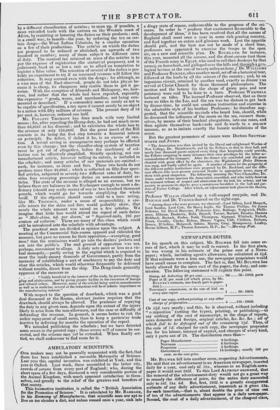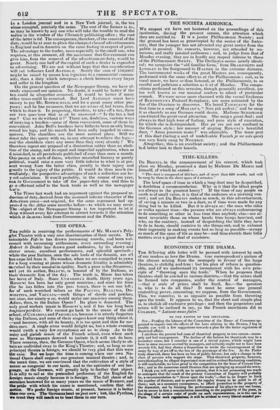NEWSPAPER-DUTIES.
IN his speech on this subject, Mr. BULWER fell into some er- rors of fact, which it may be well to correct. In the first place, he was wrong in his estimate of the prime cost of a News- paper; which, including agent's allowance, he calculated at 51d. If that estimate were a true one, the newspaper proprietors would have small cause to complain. The fact is, that Mr. BULWER has barely allowed for the mere cost of the paper, the duty, and corn- - mission. The following statement will explain this point.
Stamp, 4d. deducting 20 per cent 3d. 06-180th parts Paper at 2/. per ream (of which price, by Mr Bor.waa's estimate, one-fourth part is paper-
duty) 1 Newsman's commission, at the rate of 13d. on
every nine copies 1 80-180th
Cost of one copy, withoutprinting or any other charge of preparation 5 116 -180th Or 5id. very nearly; and this, be it observed, without including " ccmposition" (setting the types), printing, or publishing,—to say nothing of the cost of manuscript, in the shape of reports, news domestic and foreign, original articles, &c. &c. &c.; all of which fall to be defrayed out of the remaining lid. Thus, of the sum of 7d. charged for each copy, the newspaper proprietor has for his labour, interest of capital, and charges of every kind, only 5 parts out of 28. The distribution runs thus—
Paper Manufacturer Newsman Proprietor
Government 100 per cent, on the cost price.
Mr. BULWER fell into another error, respecting Advertisements. He said that an advertisement in an American newspaper, inserted daily for a year, cost only 6/. 188., whereas in an English news- paper it would cost 2021. To this Lord ALTHORP answered, that the removal of the advertisement-duty would not go a great way to remedy the difference of price, for the entire duty amounted. only to 54/. 158. 6d. But, first, 2021, is a greatly exaggerated, estimate of any daily advertisement, inasmuch as it gives 13s. for each insertion,—that is, about double the price of nine out of ten of the advertisements that appear in a daily newspaper. Second, the cost of a daily advertisement, of the cheapest class,
3 farthings. 6 farthings. 5 fat things. 14 farthings; exactly
in a London journal and in a New York journal, is, the tax alone excepted, precisely the same. The cost of the former is 4s., as'may'bo known by any one who will take the trouble to read the mike in the window of the Chronicle publishing-office ; the cost of the latter is 6d. The consequence, therefore, of the removal of the duty, would be at once to place the cheapest class of advertisements in Englund and in America on the same footing in respect of price. The advantage to the trader, more especially to the small one, who requires, at this moment, all the assistance that Government can give him, hom the removal of the advertisement-duty, would be great. Nearly one half of the capital of such a dealer is expended iii advertising. We are not without hope that this consideration will yet influence Lord ALTHOli.P. Surely the sum of 160,0001. might be raised by means less iejur ions to a commercial commu- nity, than a duty whieh interposes a check between every buyer and seller in the kingdom. On the general question of the Newspaper Stamp, we have al- ready expiessed our opinion. No doubt, it would be better if the tax could be altogether removed. It would be better if many other taxes could be removed. But Lord ALTHORP must have -money to pay Mr. ROTHSCIII Ln, and for a great many other pur- poses; and he has no source, that we are ewers of, but taxes, from which to draw it. In proposing, therefore, to take off a tax, there are two ques'ions that m .st be answered—" Is the tax a bad one ? 'Can we do without it ?" There are, doubt:ess, various ways of Carrying a buiden—some Of them convenient, some of them in- -convenient. John Bull's burdens have hitherto been mostly hung round his legs, and his march had been sadly impeded in cense- --quence. 'The shoulders are the more natural place. Still we must :take this query with us, in any attempt to relieve the legs- eati-the shoulders Carry 'airy more* than they carry already ? We therefore :repeat eur proposal of a, diminution rather than an aboli- tion of the stamp, and its equal and impartial application, when so d thinished, to all periodicals published ofanrer than once a month. Orie penny on each of these, whether miscalled literary or purely political, would raise a sum very little inferior to what is at pre- sent wrung from the latter class, greatly to their injury and greatly to the injury of the public. It would do thus much im- mediately; the prospective advantages of such a reduction are be- yrnd calculation. It would probably, in the course of one year, ena de 'Government to take off the paper-duty also and thus to gi e effectual relief to the book trade as well as the newspaper trat'e: he Times last week had an argument against the proposed re- duction of duty,derived- from the assumed inferior character of the Arherican press—not original, for the same aigument had ap- pears d in the Atlas some months before—to which .we may recur. The ubject of the Newspaper Stamp is too important to !et it drop without every fair attempt to attract towards it the attention which it desetver both from Government and the Public.



























 Previous page
Previous page